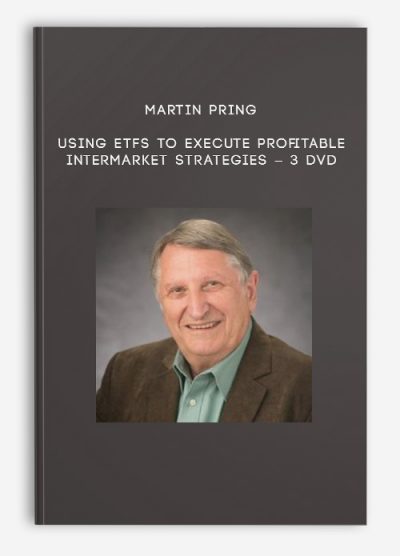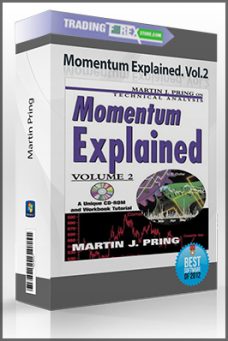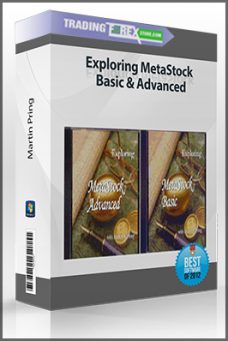Description
Martin Pring – Using ETFs to Execute Profitable InterMarket Strategies – 3 DVD
Get Martin Pring – Using ETFs to Execute Profitable InterMarket Strategies – 3 DVD onpremiumoftrader.com
Description:
This three-part DVD course explains why the sector rotation process is continuously creating profitable opportunities just waiting to be seized. It also tells you how to easily execute InterMarket and sector rotation strategies with ETFs. You are also provided the historical data to follow these relationships as well as links to keep you up-to-date.
The presentation begins with a description of what InterMarket analysis actually is. Just as the climate influences the local weather, so multi-decade swings in inflationary and deflationary forces called secular trends set the scene for individual business cycles. These secular trends in bonds, stocks and commodities are described in detail; so too is their influence on the individual business cycle associated bull and bear markets.
The connection between the business cycle and major turning points in bond, stock and commodity prices together with the consequential influence on sector rotation is explained in laymen terms. We also give you the tools to do the job by explaining concepts such as long-term momentum and relative strength.
In addition, the course provides statistical proof that these are not just pie in the sky concepts but that they actually work in the market place. You will also be provided with as simple indicators that will help you to follow this cyclical road map. Historical data, links where it can be updated and links publishing the latest info on ETFs rounds out the package.
DVD1 – Setting the Scene
The opening session explains –
- What the term “InterMarket” actually means
- What a secular trend is, and its importance
- How to spot secular turning points for stocks, bonds, and commodities
- What are primary bull and bear markets
- How to recognize reversals in primary trends using moving averages, trendlines, long-term smoothed momentum, and relative strength
DVD2 – Using the Business Cycle to Make Money from Sector Rotation
The second session explains the influence the business cycle has on the sector rotation process as well as the best way to allocate assets throughout the cycle. In this session you will learn –
- What the business cycle is, and how it determines the turning points of bonds, stocks, and commodities
- How the cycle can be divided into Six Stages providing the framework to use as a roadmap for optimum asset allocations
- How to follow simple indicators to help you identify the prevailing stage of the cycle
- How individual stock market sectors have performed in each of the six stages since 1955
- Which assets and sectors to buy, and which ones to avoid in each of the six stages
- How turning points in inter-asset relationships signal when assets should be re-allocated
DVD3 – Using Exchange Traded Funds to Execute Profitable InterMarket Strategies
The third session outlines profitable interMarket strategies and how to apply them using ETFs. This last session explains –
- The basics of Exchange Traded Funds (ETFs), what is available, and where to go for the latest information on those recently listed and filed
- How the business cycle influences the sector rotation process
- How to use the Brokerage ETFs to forecast the overall market
- How to use gold shares to forecast trends in the price of gold
- How to monitor speculative or defensive money flows through key interMarket relationships
- When to buy either inflation or deflation sensitive sectors
- How to use key economic indicators to time long term purchases of Financial, Energy and consumer sector ETFs
- How to make money in bear markets by playing the relative strength line of various sector ETF
Bond -Stock Trading course: Learn about Bond -Stock Trading
Bond trading definition
Bond trading is one way of making profit from fluctuations in the value of corporate or government bonds.
Many view it as an essential part of a diversified trading portfolio, alongside stocks and cash.
A bond is a financial instrument that works by allowing individuals to loan cash to institutions such as governments or companies.
The institution will pay a defined interest rate on the investment for the duration of the bond, and then give the original sum back at the end of the loan’s term.
A stock trader or equity trader or share trader is a person or company involved in trading equity securities.
Stock traders may be an agent, hedger, arbitrageur, speculator, stockbroker.
Such equity trading in large publicly traded companies may be through a stock exchange.
Stock shares in smaller public companies may be bought and sold in over-the-counter (OTC) markets.
Stock traders can trade on their own account, called proprietary trading, or through an agent authorized to buy and sell on the owner’s behalf.
Trading through an agent is usually through a stockbroker. Agents are paid a commission for performing the trade.
Major stock exchanges have market makers who help limit price variation (volatility) by buying and selling a particular company’s shares on their own behalf and also on behalf of other clients.



